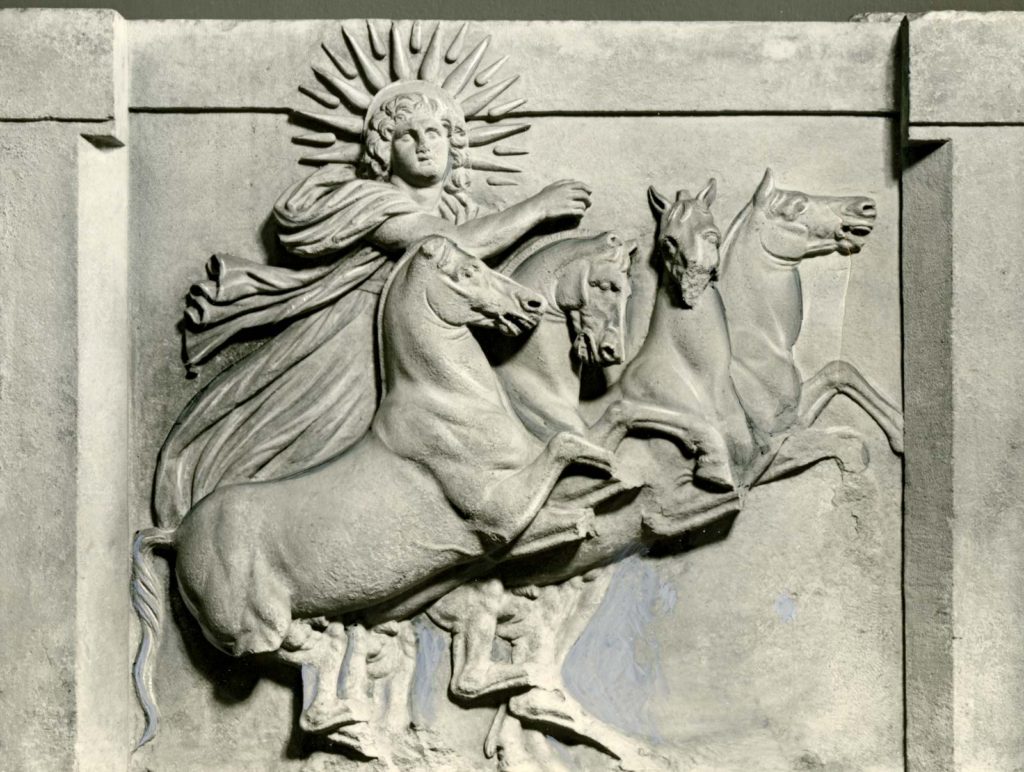Translated by Steven J. Willett

Relief of Helios from the northwest pediment of the Temple of Athena in Ilion (Troy), c. 390BC~325BC. The relief was found by Heinrich Schliemann in 1872 and is now in the Pergamon-Museum, Berlin.
Note: The evergreen pine and ivy represent the god Dionysus. Italy was entitled Hesperia by the ancient Greeks, but here it probably represents Western Europe. Cerberus is a three-headed dog who crouches violently growling as guard before the entrance to Hades. The son, a Syrian, is a clear reference to Christ, whom Hölderlin has apparently equaled with or related to the Greek gods. Finally, bread and wine in the title are symbols not just of Dionysus but of a traditional culture that Hölderlin hopes will return from the reality, Thebe welkt und Athen.
And now I will say goodby for some time as I prepare to leave Japan for our home in Oregon. I have much to do, a book to finish, family to meet, friends to entertain along the Willamette River and dreams to pursue. I give my very best to all you good pilgrims, as Pat likes to call us, and hope that my various translations have brought you some pleasure and understanding.
さろなら
9. Yes! they say with Justice, he reconciles day with our night, Leads the stars of the sky endlessly downward, aloft, Always joyful, like boughs of a perennially-green pine tree, That he loves, and the wreath, taken from ivy he chose Since it endures and even a trace of the gods who departed Down to the godless below shows in obscurity. What in the song of the ancients foretold the gods’ children, Look! for we are it, we; fruit of Hesperia it is! Wonderful and precise it’s just as humans accomplished, Give belief, who it tests! but so much happened by now, Nothing functions, for we are heartless, mere shadows until our Father Aether discerns each and belongs to us all. But in the meantime comes as a torch-bearer the Highest’s Son, the Syrian, down into shadows below. Blissful the wise men see it; a smile from all imprisoned Souls is gleaming, by light thaws to restore yet their eyes. Gently dreams and sleeps in the arms of the earth a Titan, Even the jealous, himself Cerberus drinks and retires.

Brod und Wein has prompted me to read about the life of Holderlin, which was very interesting, and sad. Fortunately, and against the odds, he survived with help from friends.
Safe travels Mr. Willett. You will be missed here until your return!
Prof. Willet,
Thanks for all the poems and commentary. I hope to see your work here again sometime. Akin to an oasis within an oasis. Best wishes for a great summer.
Ishmael Zechariah
The very best to you in your travels, and joy getting together with family and friends. Thank you for sharing your translations.
thanks for the intro to the different styles of poetry.never knew the stuff existed.
here is one I wrote about a dog
I had a stray dog
he came to me one night
out of the cold and fog
had lost his fight
I took him in
gave him a bone to chew
he was pretty thin
I named him blue
he had a black coat
white patch around his eye
when i took him on the boat
he would bark at the sky
he was a man’s best friend
when times were lonely
on him i could depend
for some company
I woke up one morning
blue was gone
he had left with no warning
at the crack of dawn
I searchd for him all over
called his name out loud
but a free spirit will wander
i went home with head bowed
they say that some things
just come your way
and the joy that it brings
never goes away